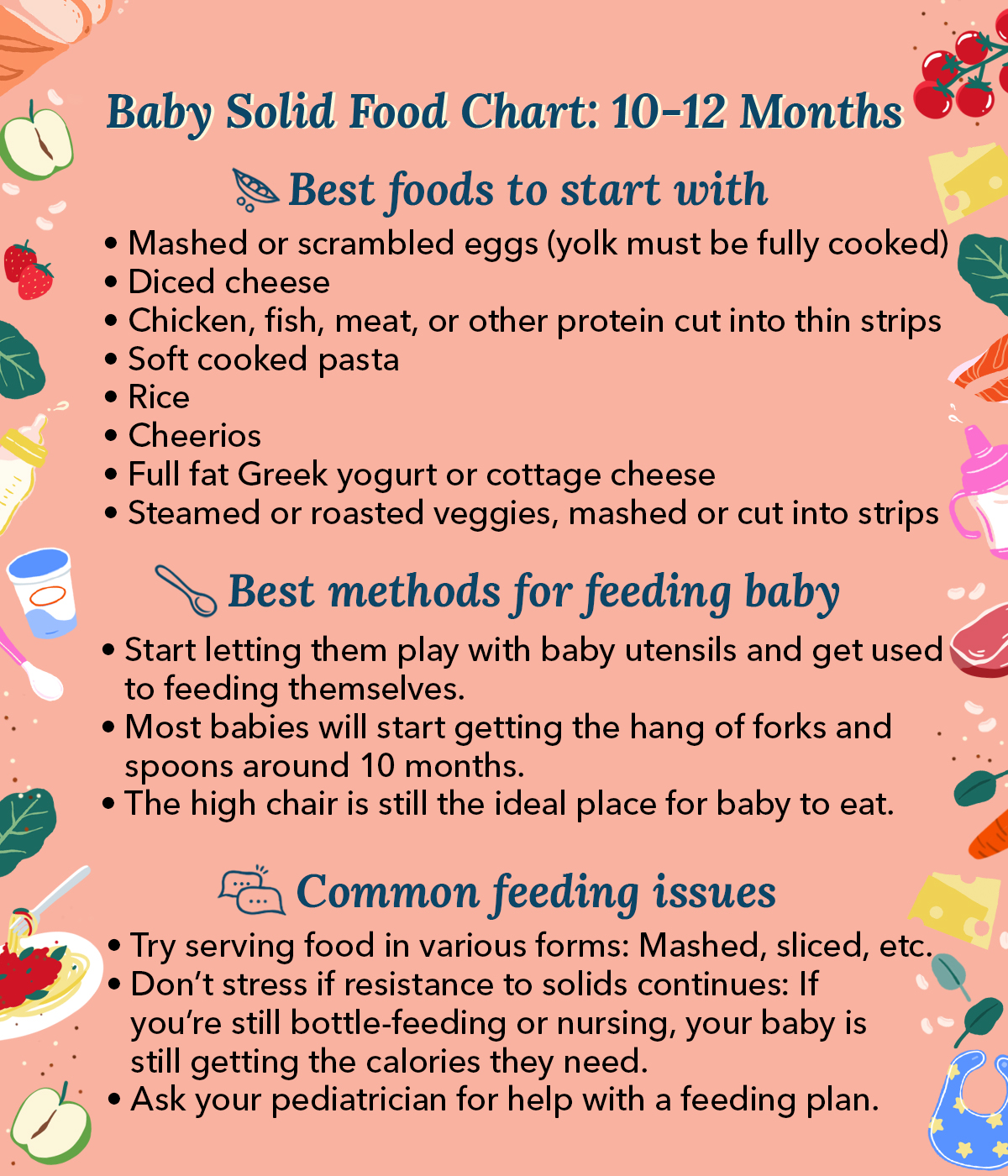
In this article
By the time your baby is getting close to a year old, a lot of transitions are on their way — and a big one is what to feed your baby. While their main nutrition has been breastmilk or formula with solids being added in for a few months now, at a year old you’re probably feeding baby solid foods three times a day for the bulk of their calories. That can definitely be intimidating, especially if you’ve settled into a comfortable routine of purées and safe solids that are working for you.
Ready to take on the next step in your solid food adventures? Here’s what you need to know.
Solid foods 10-12 Months: How to feed baby

By now, you’ve probably figured out how to feed a baby — and you’ve learned what and how yours likes to eat. But now that they’re getting older, you can branch out a bit, and start letting them play with baby utensils and get used to feeding themselves a little more. According to the CDC, most babies will start getting the hang of forks and spoons around 10 months, fully perfecting it after 12 months. So if they’re still working on this skill, don’t worry — it’s totally normal!
But how much should baby eat at this age? Regardless of what feeding method you’ve gone with — baby led weaning, purées only, or otherwise — the CDC recommends giving babies something to eat every 2-3 hours, which would include 5-6 meals plus snacks (and yes, count their bottle or nursing sessions in this). As far as the amount goes, American Academy of Pediatrics states that babies need to aim for about eight ounces of breastmilk or formula around 4-5 times a day. Follow your baby’s hunger cues to determine how much of solid foods they may want beyond that.
Remember, your baby’s high chair is the ideal place for them to eat — and not just to control the mess, but to keep them safe, too.
Solid foods 10-12 Months: Choosing the best foods for baby

Now that your baby is a bit older, you may be ready to move past purées and baby oatmeal, and baby food for a 10 month old and beyond will look a little different from what they were eating when you first started feeing baby solid foods.
Here are a few ideas for the best solid foods for your baby at this age:
- Mashed or scrambled eggs (make sure the yolk is fully cooked)
- Diced cheese
- Chicken, fish, meat, or other protein, cut into finger-sized strips
- Soft cooked pasta
- Rice
- Cheerios
- Full fat Greek yogurt or cottage cheese
- Steamed or roasted veggies, mashed or cut into finger-sized strips
Though your baby is still getting the majority of their nutrition from formula or breastmilk, it’s also a great time to start introducing healthy eating habits.
“We have evidence in the childhood nutrition literature that feeding styles may influence not only a child’s body weight but their relationship with food and how they behave around eating,” childhood nutrition expert Jill Castle told CNN.
At this point you’ll still want to avoid honey, due to the risk of botulism in infants. You’ll also want to avoid cow’s milk, added sugar or salt, and anything cylinder-shaped that could pose a choking hazard.
Looking for a sample 10 month old baby food menu (or even babies who are 11 and 12 months old)? The AAP has plenty of meal plan ideas!
Solid foods 10-12 Months: Feeding issues and concerns

If your baby is not eating solid foods, there are a few things you can try. You can offer them different foods in different forms — some might like to eat a mashed banana, while others might prefer it cut into strips they can pick up. Every day is different, so keep plugging away at it without forcing your baby to eat if they’re not into it that day. Stay consistent, and baby will likely get the hang of it soon enough.
“With my oldest, I learned a little rhyme to guide food decisions during the first year: Food is fun until they’re one. This saying has reminded me that exposure and experimenting are key, but full meals are not,” mom Gretchen Bossio wrote for Mom.com.
My baby is not eating anything. What should I do?
If your baby is still drinking their normal amount when they’re bottle feeding or nursing, you can rest assured that they’re getting the calories they need — and of course, some babies take longer to adjust to solids than others. But it’s also a good time to call your pediatrician, who will be able to help make a plan going forward.




